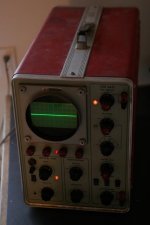@leaknoil:
I don't know what it is you're thinking, I only have your actual words to go on.

There was no intent on my part to belittle what knowledge you have and it is quite likely that I know much less than you on the subject - like I said, I only have your words to go on. I was just trying to be informative based on your post. However, if there is some misunderstanding here then I will gladly apologize for my part: I'm sorry.
Regarding Heathkit. I too think it is special stuff and collect it when it comes along. They built some very good equipment in many cases, and they stand out for the quality and completeness of their kits and I am aware of their status.
Regarding old scopes. I was quite genuine in what I said and actually thought I was answering your question. An old scope is
VERY useful. That is all I have and I use it for real world audio stuff and not just as a collectible. In fact, the one that you have looks like a better one.

If you are already into electronics (how would I know?) then you already know what I am talking about and don't need my advice. (Ignore me then.) As an old school audio guy I just like to encourage people to get into this stuff so I make sure they know that they don't need new or expensive equipment to do it. I am fairely poor (old age pension) so this kind of information could be useful to me and others in my position. Someone with a job, or similarly well off, would probably not care. I'm likely in my own little world here when it comes to economic thinking.

If you think this is obvious and that I shouldn't say it, fine, but how would I know that?
The specific model of scope you showed is actually very nice and is also particularly interesting because I cannot find any information on it. I looked for quite a while yesterday. Perhaps you did too and that is what you were actually asking about. That was not expressed in your original post and I had no way of knowing. If I find anything on the model, I will PM you or post here.

Cheers, Ole

